Lake Gaston is situated on the border between North Carolina and Virginia.
It is a sizable lake that is approximately 35 miles long and features 350 miles of coastline.
It has become a popular place for swimming, boating, and fishing.
Alligators tend to live in the southeastern part of the United States, so is it possible that you’ll find any in this lake?
Find out the details about this lake and alligators throughout the area.
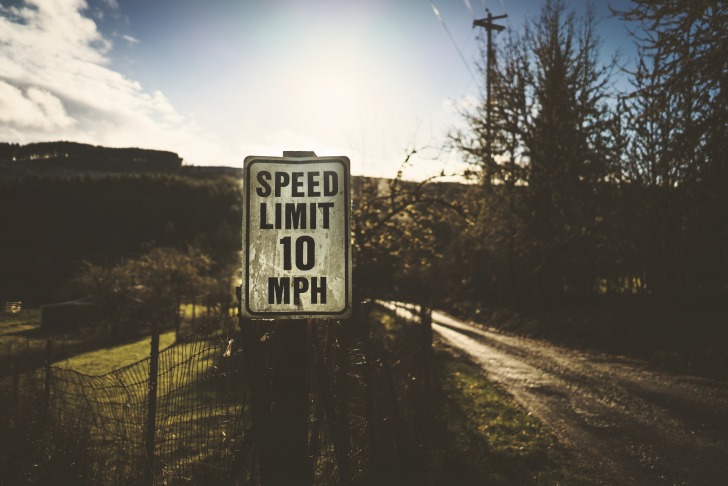
Contents
So… Are There Alligators in Lake Gaston?
There have been the occasional sightings of alligators in Lake Gaston.
While it is typically too far north for alligators to be considered native to the area, they have been known to wander.
The majority of alligators are found in southeastern states such as Florida, Louisiana, and Texas.
In fact, nine out of the top 10 lakes that are considered “alligator-infested” are in Florida.
Alligators stop being native to an area right at the South Carolina/North Carolina state lines.
North Carolina and Virginia can get too cold for cold-blooded animals to survive.
While it is possible for an alligator to live in the freshwater lake and find plenty to feed on, they won’t last past the harsher winter months.
When the water is too cold, alligators cannot be active – and when it gets very cold, they cannot even digest food.
The majority of alligators found in Gaston County have been caught while they are still young.
They may have slowly migrated north. However, most of the instances are because of someone illegally keeping an alligator as a pet – and then setting it free at one of the parks once it becomes too large or cumbersome to care for.
There have been reports of gators in 2011, 2014, 2015, and 2018 that have been recovered by the NC Wildlife Resources Commission.
Alligator Species in Lake Gaston
There is only one alligator that would likely be found in Lake Gaston, which would be the American Alligator.
Although there are over 20 different species within the Order Crocodilia, there are only two species of alligators – Chinese and American.
The Chinese Alligator is not going to be found outside of Southeast Asia, which leaves the American Alligator.
The American Alligator is listed as the species Alligator mississippiensis.
It translates to lizard of the Mississippi River.
It is found in a variety of freshwater swamps and marshes but will sometimes choose a habitat that is a lake or river.
Only a small amount of salinity in the water can be tolerated since they lack the salt-secreting glands that are found within crocodiles.
Freezing conditions cannot be tolerated for long – and even though they’ll burrow to hibernate, the temperatures cannot get too cold.
It’s why most hepatologists have determined that alligators won’t thrive in the North Carolina/Virginia area for long.
Alligators have the potential to get large.
The adult male can reach lengths of about 14 feet while females reach lengths of about 9 or 10 feet.
The alligators that have been randomly pulled from Lake Gaston and the bordering areas have not been very large – most are pulled when they are only two to three feet, which demonstrates that they have not reached adulthood.
Is It Safe to Swim in Lake Gaston?
For the most part, Lake Gaston is safe to swim in year-round.
While there is various wildlife to be aware of, you can take the necessary precautions.
It’s always a good idea to enter the water with caution – and in the presence of others.
Snakes and even predatory mammals can be found in and around the water – so if there are signs that tell you of something, be sure that you read them and act accordingly.
The water at Lake Gaston is tested regularly – and it is usually of a high quality that is safe for you to swim in.
Every now and again, there are bacteria – and that’s when the state will choose to close the lake.
If the lake is ever closed for bacteria or for another reason, you’ll want to make sure to heed the warnings and not enter the water anyway.
The lake has public access and there are various designated swimming areas.
There are no lifeguards, so you will need to swim at your own risk.
Many say that the water has virtually no pollution, which means that it’s almost clean enough to drink without any treatment.
This means that if you accidentally ingest any water from the lake, you should be just fine.
There typically aren’t any reasons not to swim in Lake Gaston, but there have been reports of alligators and even bull sharks at various times.
It’s best to stick to the designated swimming areas so that you don’t run into problems.
Interesting Alligator Facts in Lake Gaston
Alligators don’t make it a habit to live in Lake Gaston.
However, there are quite a few interesting facts to know about how they survive in the lake – and even some of the stories about when they have been found by those who live around and frequent the lake.
Since 2015, the number of gator sightings has increased substantially.
It seems that the alligators are showing up in more residential areas – and the Wildlife Resources Commission have issued warnings for people to exercise caution.
Areas where alligators have been found:
With such sightings, it’s easy to see why some would be found in Lake Gaston – it’s a freshwater lake that is filled with striped bass, sunfish, catfish, and other fish that could sustain a gator quite well.
A study conducted by the North Carolina State University says that gators are increasing their population – and many will live in bunches for survival.
Those that live alone tend to die quickly.
What this means for Lake Gaston is where there is one alligator, there are likely to be others.
If you do want to see an alligator, the best way to do so is in captivity – and “It’s a Zoo Life” in Macclesfield has been known to have some on display.
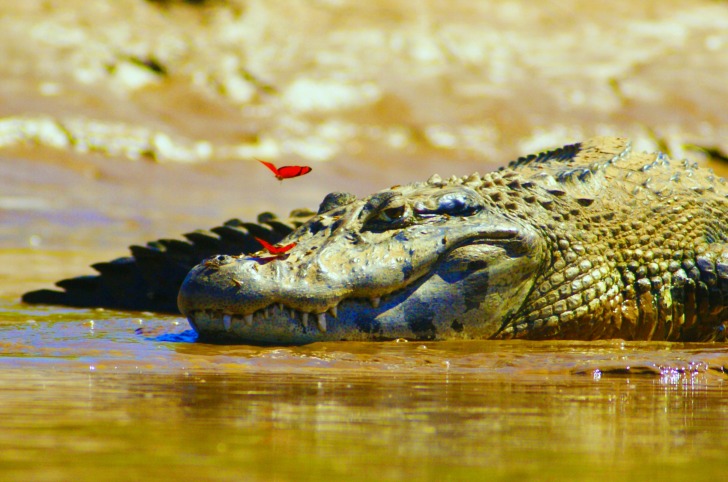
Alligators vs. Crocodiles
Alligators and crocodiles are both found in the United States – though neither are native to Lake Gaston or the surrounding areas.
Alligators are typically found in the southeastern part of the U.S. and are characterized by a blackish/gray coloring and a rounded snout.
With their mouths closed, they’ll have an overbite, but you won’t be able to see their teeth.
Additionally, they have stumpy legs but can still run surprisingly fast.
Crocodiles are not as common.
They live in the southern part of Florida and throughout some of the coastal areas of the Caribbean.
They are found in salt and brackish water and have a green/brown coloring.
They have a pointed snout, and their teeth are visible, even when their mouths are closed.
They’ll have longer legs than an alligator, but they tend to be shy and reclusive, so they won’t attack nearly as often as an alligator.
Since Lake Gaston is a freshwater lake, the only one of these reptilians that you are ever likely to encounter, even though extremely rare, would be the American Alligator.
3 Safety Tips for Swimming in Alligator-Infested Waters
While you hope to never swim in alligator-infested waters, be sure that you know what to do.
You have to prepare for the possibility of alligators approaching and even attacking you if there are some in the water. Remember, you are entering their territory.
There are some safety tips that you should follow:
- Keep away from the tall grass. The tall grass along some of the coastal areas can provide you with limited visibility. You won’t be able to see the alligators. Further, many female alligators will breed here, and if it thinks that you are coming for their babies, they will attack as a way to protect their young.
- Know how to fight. In the event that you are attacked, you have to be ready to fight off an alligator. This includes running, gouging its eyes, and even smacking it on the snout. Avoid getting into its grip where it can start to roll you underwater.
- Always have others with you. Be sure that you never go into the water when you’re alone. Have others with you, either in the water or on land. This way, if there’s an emergency, there are people who can help.
Summary
Alligators may show up from time to time in Lake Gaston for a number of reasons.
Although they are not native to the area, they wouldn’t have to travel particularly far from their native area in order to make use of the lake.
In most instances, alligators are caught before they have a chance to become large and dangerous to the human population.
The lake is a safe place where you can participate in a number of water-based activities, including swimming.
Even if there are alligators in the water, there aren’t going to be many, and they are likely to be under 3 feet in length.
It is a good idea to proceed into the lake with caution and always follow the various safety tips.
The state’s wildlife website also provides you with a lot of information so that you know about the various species found in and around the lake as well as what warnings are currently in place.
One thing is for sure – Lake Gaston is currently not infested with alligators and not likely to be at any time in the near future due to the colder winter months.
Frequently Asked Questions
How many alligator attacks occur every year?
Most alligators will only attack when provoked, and the majority of attacks occur in Florida.
There are typically only four or five alligator deaths that occur throughout the entirety of the southern United States every year.
Is it legal to own an alligator?
That depends on where you live.
In North Carolina, there is no statewide regulation that prevents you from owning any kind of exotic or dangerous wildlife, including alligators.
However, most counties would require that you at least obtain a permit.
In Virginia, it is illegal to own an alligator.
What is the desired temperature for an alligator?
Alligators are identified as being ectothermic, so they depend on external sources of heat.
They will be the most active when the weather is above 82°.
Once the temperature reaches below 70°, they not only stop being active but also stop feeding.
Considering the temperatures around North Carolina and Virginia during the winter, alligators are unlikely to survive.
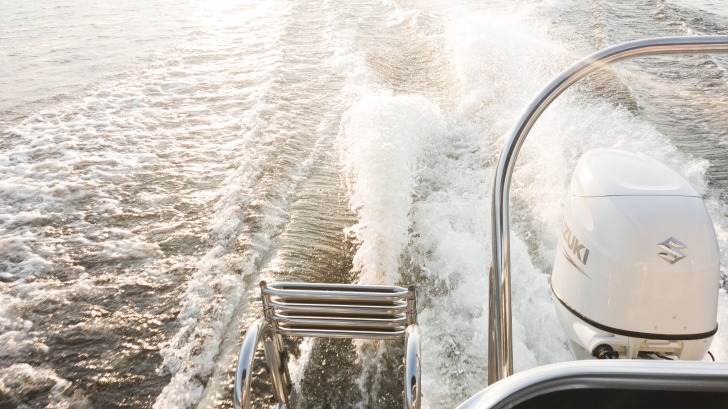
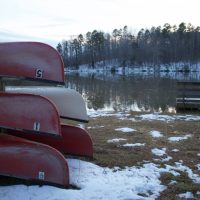

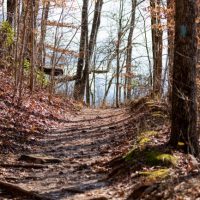
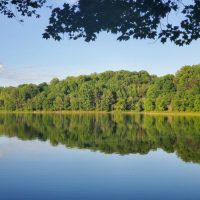
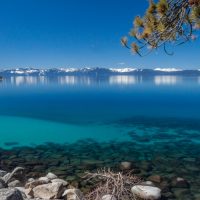






Lake Gaston is a popular destination for water activities and while there have been reports of alligators in the area, it is still considered safe for swimming, as long as precautions are taken.
Lake Gaston is a beautiful and popular destination for water activities, but it’s important to be aware of the potential presence of alligators in the area.